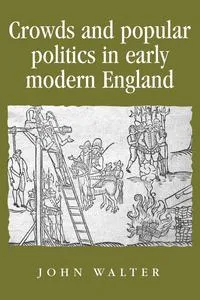Crowds and Popular Politics in Early Modern England
Автор: John Walter
Переплёт: Мягкая обложка
📓 Early modern England was marked by profound changes in economy, society, politics and religion. It is widely believed that the poverty and discontent which these changes often caused resulted in major rebellion and frequent 'riots'. This collection of essays offers a radical re-evaluation of the nature of crowds and protests during the period. The work of John Walter has played a central role in defining current understanding of the field and has been widely read and cited by those working on the politics of subaltern groups. Whereas the politics of the people have often been described as a 'many-headed monster'; spasmodic and violent, and the only means by which the people could gain expression in a highly hierarchical society and a state that denied them a political voice, Walter argues for the inherently political nature of popular protest through a series of studies of acts of collective protest, up to and including the English Revolution. Telling stories through a series of micro-histories it seeks to restore an identity to those otherwise labelled as 'rioters' or traitors by tracing them back into the communities from which their protests sprang. These studies move beyond the stereotype of riot to explore the often subtle ways by which protestors framed their protests. By manipulating the rituals and symbols of state and society crowds could speak through their acts and by appropriating the public transcripts of the responsibilities of power and property holders claim legitimatisation for plebeian politics in a culture that proscribed protest and threatened bloody punishment for those who disobeyed. Against a tradition of historical writing that sees early modern projects as at best 'knife-and-fork politics', and at worst as 'pre-political', the volume argues that crowds have to be seen as exercising a political agency within a 'politics of subsistence'. It will make fascinating reading for historians of the period.
Мнения
